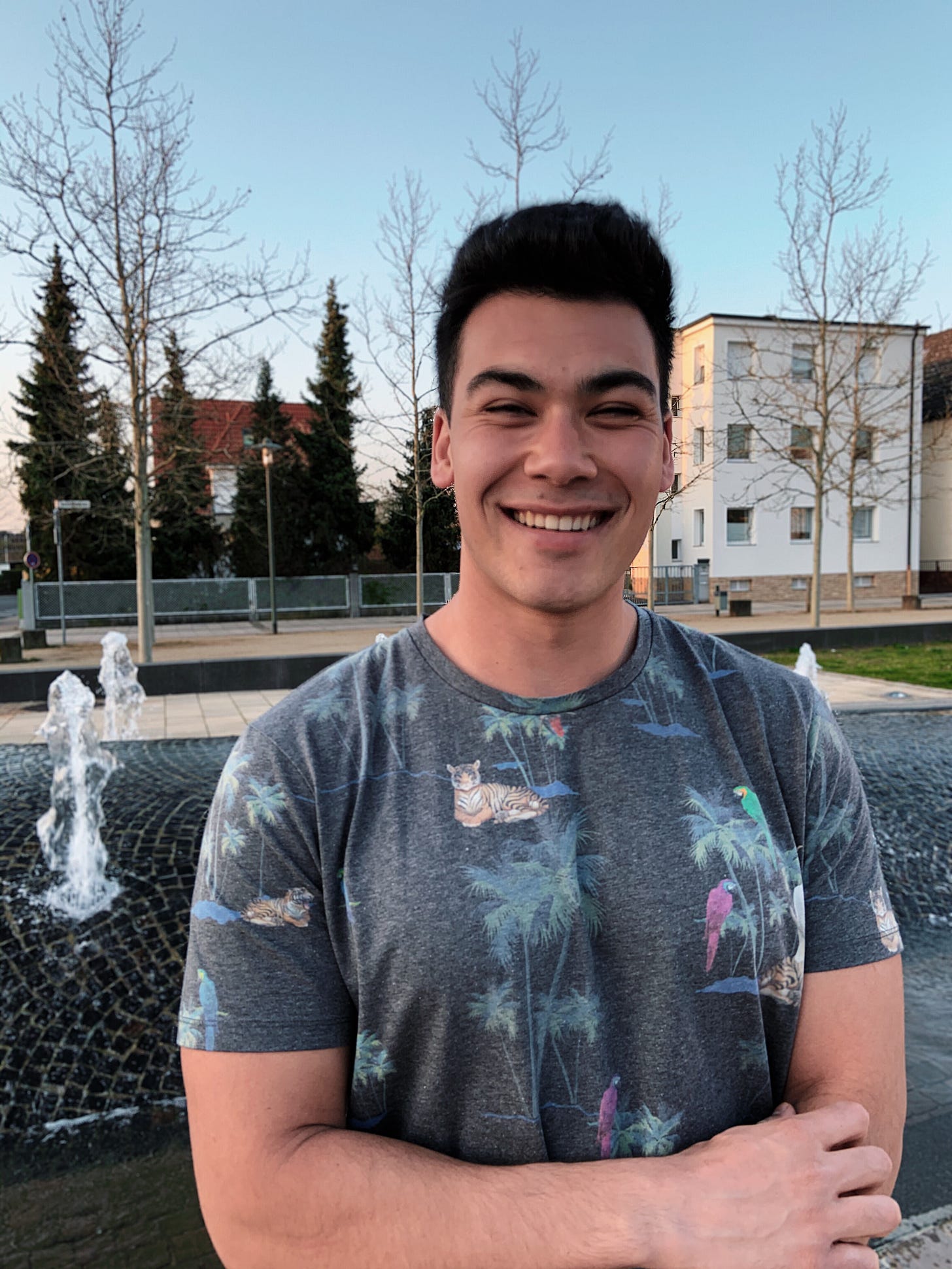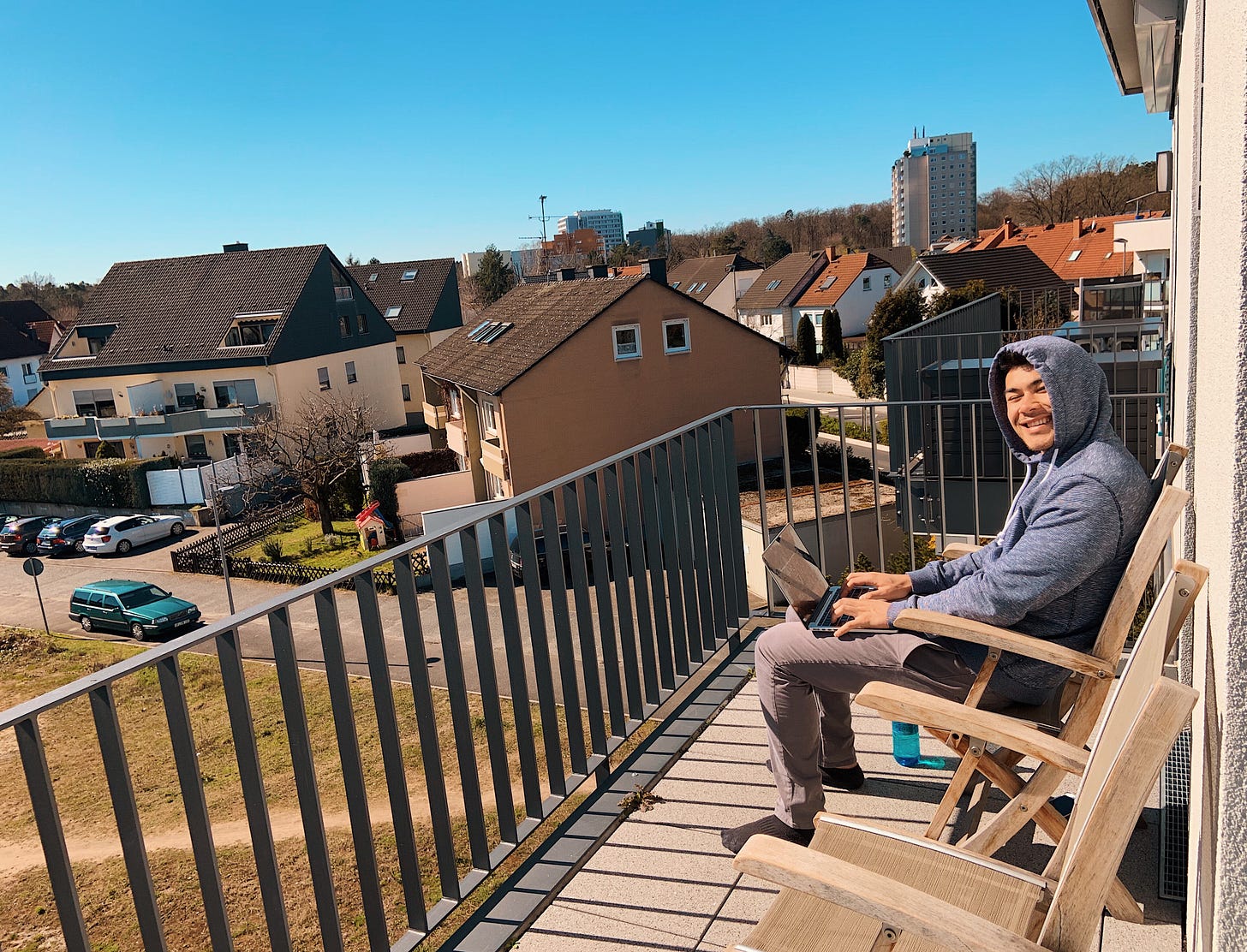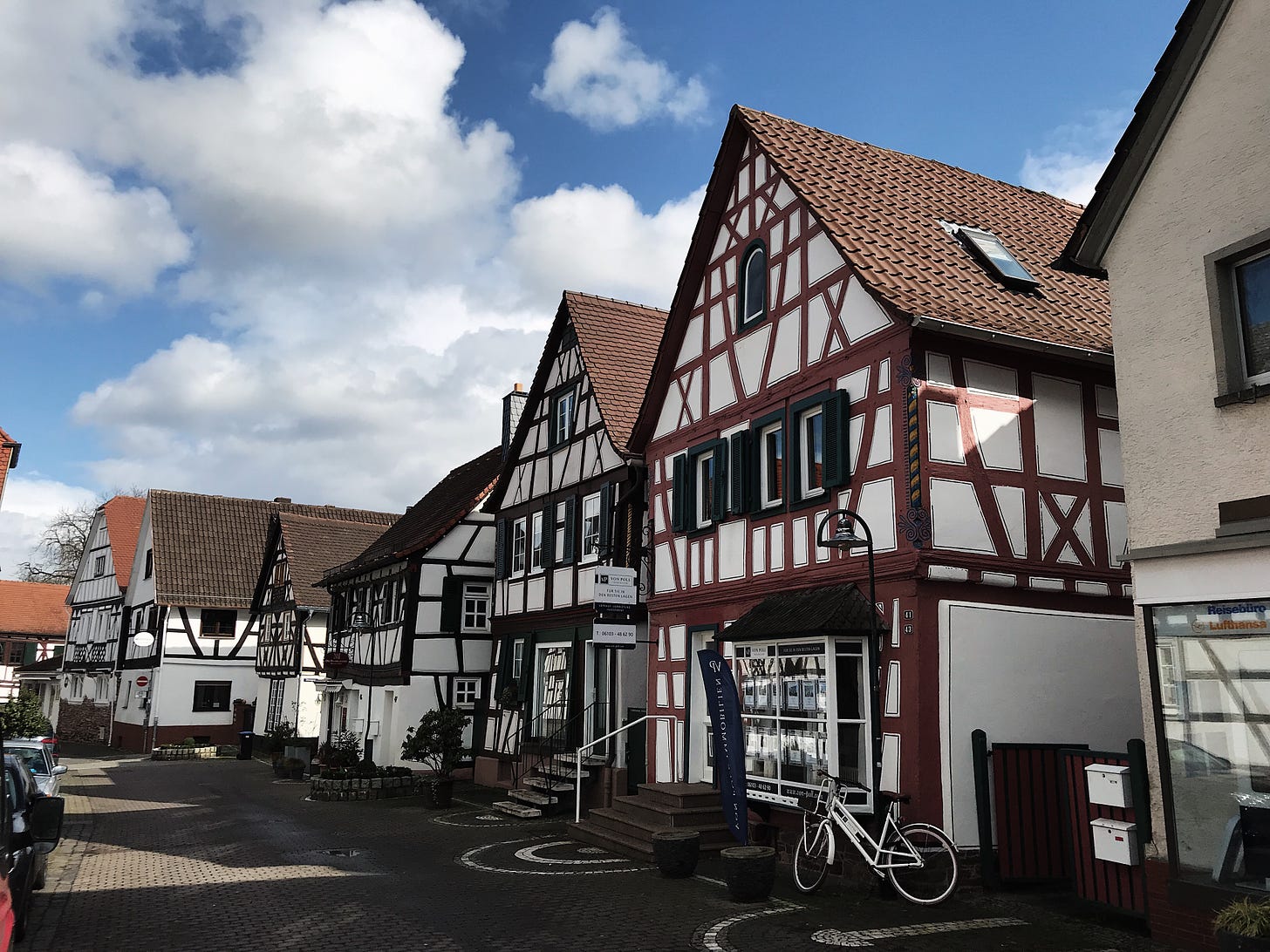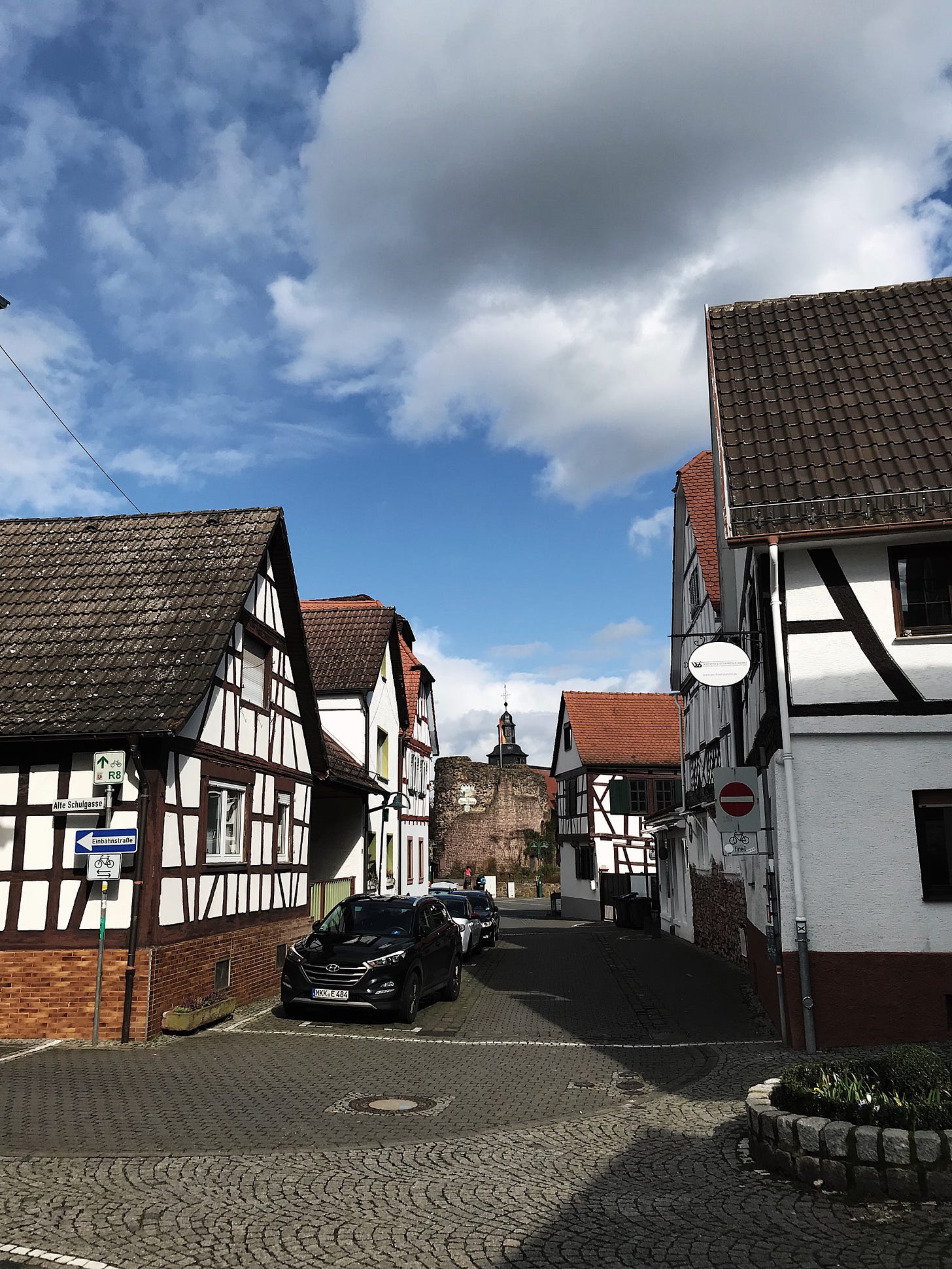
Quarantined in Germany: COVID-19 Update
At the beginning of March 2020 I flew from Spain to Germany to visit my aunt, uncle, and cousins. I arrived on March 6th and had planned to return to Madrid on March 10th. Today is April 2nd; I write this now still in Germany.
When I had arrived in early March, news reached us that Madrid was erupting with cases of COVID-19, overwhelming hospitals and healthcare workers virtually overnight. The logic of gradual increments of increase seemed moot: one day things were normal, the next day the pandemic dropped onto Madrid like a stage curtain after the final act. Given the escalation, my relatives and I decided it would be best for me to remain in Germany.
I now reside in Heusenstamm, a small suburban sprawl approximately a 30-minutes’ drive from Frankfurt. Traffic here is sparse—with or without a pandemic—and both the days and nights are quiet. My aunt and uncle live in a neat and quaint third-floor apartment here in the German countryside.
The apartment is new but the ambience is not quite this. There is an effect which is not unpleasant created by the newness of the furniture and technology in combination with the antiquity of old keepsakes, photos, and things of a previous age; the feeling one gets is that the upkeep is done with a well-practiced, experienced eye. There is a discernible absence of the cheap and tawdry that young people so often gravitate to out of either necessity or callowness. Most notable are the sundry spans of bookshelves in both bedrooms and the living room. Notwithstanding libraries and bookshops, I have never seen this many books under one roof (though unfortunately I cannot indulge, as they are all written in German). I’ve come to like it here; my old soul fits right in.
Despite the rising COVID-19 cases across Germany, there is nothing immediately pressing here. It is as if we live in a small container, tightly sealed off from the rest of the country. We are following the rules of social distancing and at-home isolation similar to the rest of the world. And yet, given the smallness of Heusenstamm, it does not seem to make a difference.
The days are long and empty but charming enough. In three weeks of home time, I have yet to pass an hour in boredom. I relish in downtime, for that leaves me the opportunity to write and to think—habits that ordinary life intrudes upon regularly.
The apartment balcony has a small but adequately sized patio with wooden chairs and a coffee table. The space provides a modest overlook of the houses nearby and the trees further down, and resembles something of a halcyon postcard of a previous age. The area itself was developed only in recent years though the German architecture creates the appearance of what I imagine medieval Europe once looked like (at least to my foreign naivety). Some homes are small and some are expansive; both variations are tightly packed with one another and sometimes even connected by a shared wall and rooftop.
Writing from the balcony, I can see children playing in their backyards and elderly couples bundled up and gloved walking nearby. Parked cars and too-still streets create an eerie backdrop. I can hear the silence loud and clear. It is foreboding; and rings louder and truer than the commotion of a metropolitan. Local grocery stores have become the only places still open for business, though they too remain sparse and barren like a scene from an apocalypse film. Malls have shut down entirely, restaurants too; cafes have removed the chairs and tables in an explicit hint that they do not want loiterers sipping lattes.
The sun is out often and more clouds dissipate with each passing day. The last bite of winter still hangs in the air as if to spite the lack of precipitation. Forests surround and imbue the surrounding neighborhoods, creating a mosaic horizon of tall trees and steeply angled mahogany rooftops. The trees nearby are tall and orderly, like soldiers in uniform waiting at attention. The ones in the distance appear as if they have been painted onto the skyline. I am glad most days the sky remains clear and the brush verdant and dense. There is nothing like the contrast between blue, blue air and the deep, muddled green of the trees that reach upwards.
School children must have been ecstatic at first when they were told schools were closing and they would be staying home for the foreseeable weeks (months?). The excitement surely has worn off by now, replaced by domestic boredom and the tedium of nothingness. Too many consecutive days of leading yourself rather than allowing routines dictate your day lead to a cluttered mind and restless spirit. I’ve become restless myself, though I have writing as an outlet; for me, playing with words on a page is like a dog getting their run in.
Reading, too, has saved my spirit from insanity. Quiet afternoons spent in between pages of books and halfway productive mornings trying to string words together have made this an altogether enjoyable stay in Germany thus far. Since my arrival to Germany, I’ve finished four books: The Moon and Sixpence by W. Somerset Maugham, The Summing Up also by Maugham, The Metamorphosis by Franz Kafka, and The Sign of Four by Arthur Conan Doyle, one of the classic Sherlock Holmes mysteries.
In Maugham’s memoir The Summing Up, the author recounts his life as a writer and speaks upon reflections of a writer’s life. He talks of his knack for observation far more proudly than he does of his ability to create fiction. The people he met across different countries gave him the material for boundless stories. He wrote about how it was rare for him to sit down with a person in conversation and not be able to write a story about it.
It makes life sound practical for writers: simply go live and recount, live and recount; save the verbosity for poets and leave dragons and dwarves out of it. Just tell the truth about reality—the normalcy of people, the oddities of experience, the beauty of the natural world—fiction such as this rings the truest.
These previous two months, first living in Spain and now in Germany, have provided a great deal to draw from for myself. Experience makes for the best prose, fecund and ripe for me to piece together with imagination. It makes things easier for me, as once I’m in a place where strange things are happening, I only have to observe and record rather than harp my imagination while I fiddle with my pen. For this reason I am grateful to be where I am, though of course the circumstances that landed me here were grim and troubling.
These articles here are anecdotes to my life. I’ve chosen to write more recently because of the events transpiring all around. The novel coronavirus has stalled world happenings and day to day life to such an extent that people are talking now of the importance of journaling to record the events for the future (so each of us may hold something akin to Anne Frank’s diary perhaps).
Ordinary people can observe and experience extraordinary things, because the truth seems to be that there is no such thing as “ordinary.” If this is the case, all that is left must be extraordinary.
Stay safe, stay healthy, and pay attention. Don’t let history pass without your noticing.
Until next time.








